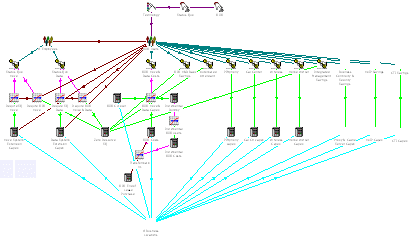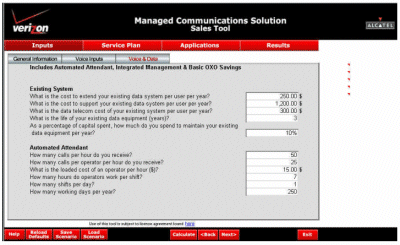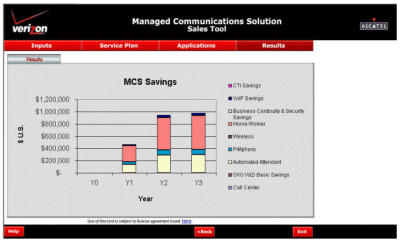In May 2005, Alcatel partnered with Verizon to launch its Managed Communications
Services nationwide to small and medium businesses (SMBs) in the USA. Managed Communications
Services offer many tangible benefits to SMBs, including:
- enabling enterprises to focus on their core businesses by out-tasking the management
and operation of their voice and data networks and CPE to Verizon
- reducing their capex requirements through pay-per-user pricing
- reducing networking costs by using VoIP over Verizon’s DSL or FlexGrow®/T1 services
- improving employee productivity through teleworking and remote call centre agent
features
- increasing revenue through outbound call centre applications.
Managed Communications Services have four key components: the Alcatel Omni PCX Office,
an industry-leading IP-PBX with an installed base of 500 000 customers; Verizon’s
network services (for interconnecting business sites); Alcatel’s Remote Service
Center, a remote management platform which manages the entire operation from provisioning,
changes, troubleshooting, upgrades, backups and billing; and Alcatel’s Business
Partner Management which provides on-site implementation, maintenance and sales
training to accelerate the market rollout.
As part of the Business Partner Management, Alcatel was tasked with creating an
MCS sales tool to enable Verizon salespeople to demonstrate the Total Cost of Ownership
(TCO) benefits of MCS to customers when compared to their present mode of operation.
Verizon needed the tool to be simple to use, yet flexible enough to evaluate all
possible combinations of the MCS features and applications to meet individual customer’s
requirements. Speed was a key factor, as the entire analysis process had to be completed
within 20 minutes. In addition, Alcatel had to deliver the model on a tight deadline.
Using STEM to build the MCS sales tool
To meet these needs, Alcatel’s Fixed Communications Group’s business case modelling
team, located in Ottawa, Canada, used the
D-STEM software to create the MCS
sales tool. STEM enabled Alcatel to quickly create the business logic for the tool,
and provided faster editing capabilities than Excel itself. The D-STEM feature enabled
the export of run-time tools to hundreds of field users without additional licences
or STEM training. The e-STEM capability also enables Alcatel to publish a web version
of the tool.
An attractive and user-friendly Excel interface was used as a front-end to the D-STEM
model. The Excel interface gave salespeople a familiar GUI for entering inputs and
displaying results, as well as generating a printable summary of the results for
the customer during the sales visit. To simplify installation, the entire tool was
wrapped in InstallShield to free users from the challenges of using Excel macros
to install the STEM add-in toolbar.
The figure below shows the modular design of the STEM model to enable the layering
of applications and selection of voice-only or converged scenarios.

STEM model of MCS tool (Source: ALCATEL)
A simple question-and-answer format was used to collect customer data and quickly
branch to the desired type of voice or converged solution. The model starts with
basic features and connectivity and then enables the user to progressively layer
up to eight enhanced applications and features into the business case (see figure
below). While most applications are designed to save opex costs, two also enable
the generation of additional revenue.

MCS Excel front-end to D-STEM sales tool (Source: ALCATEL)
The relative financial benefit of each application or feature is clearly displayed
in the results, to indicate which option provides the most return on investment
(see figure below). The results indicate a strong business case for MCS. Customer
experience with the solution has been very good; significant savings have been realised.

MCS Excel results exported from D-STEM (Source: ALCATEL)
In addition to the end-customer benefits, Managed Communication Services offer a
compelling value proposition to service providers:
- increase recurring services revenue beyond CPE resale, connectivity, or call minutes
- allow bundling of products, services, traffic and billing to create integrated offers
that reduce customer churn and defend or increase market share
- provide large economies of scale, meaning that service providers can offer a competitive
service - with enterprises benefiting from the cost reductions
- introduce VoIP as an enterprise telephony service on top of the IP-VPN offer.
Conclusion
The rollout of the MCS sales tool across the USA has been a complete success. Alcatel
was able to use STEM to quickly meet Verizon’s need for a TCO sales tool. STEM also
enables future versions of the tool to be quickly generated from the original model
in a fraction of the time required by Excel. The linkage with Excel enabled Alcatel
to provide a familiar interface for inputs and outputs to Verizon’s sales force.
Alcatel looks forward to forthcoming enhancements to STEM to further
automate the generation of Excel sheets and their linkages to STEM models. This
will improve the overall modelling experience for STEM users who require input–output
interfaces with Excel.
Alcatel provides end-to-end
communications solutions, enabling carriers, service providers and enterprises to
deliver content to any type of user, anywhere in the world. Alcatel’s Fixed Communications
Group (FCG) addresses the needs of wireline operators. FCG is comprised of the access,
data/IP, voice, and optics activities along with the associated network and service
management and applied solutions development.